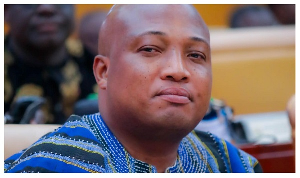 Member of Parliament for North Tongu, Samuel Okudzeto Ablakwa
Member of Parliament for North Tongu, Samuel Okudzeto Ablakwa
It is no surprise that Samuel Okudzeto Ablakwa, a key figure in the opposition National Democratic Congress (NDC), has once again resorted to the typical propaganda tactics that have come to define his public statements.
As someone once described by former President Jerry John Rawlings as part of the “babies with sharp teeth,” Ablakwa’s critique of the District Road Improvement Programme (DRIP) seems more like a continuation of his party's long-standing tradition of opposing every government policy, no matter how beneficial to the people of Ghana.
The NDC, after eight years in opposition, still struggles to offer a coherent policy alternative. In their manifesto for the 2020 elections, they failed to propose a single comprehensive solution to Ghana’s infrastructure challenges. Now, Ablakwa is attempting to distort the facts about the DRIP, a programme widely praised by Ghanaians for addressing the critical need for improved roads across the country.
Let’s set the record straight.
1. The DRIP Contract and Pricing:
Ablakwa’s claims of inflated costs in the procurement of equipment under DRIP are nothing more than an attempt to muddy the waters. While he compares prices on the internet, he fails to account for factors such as bulk procurement, logistics, after-sales support, and warranties.
These considerations are standard in government contracts to ensure long-term value. The claim that Ghana could start its own road construction equipment company with the funds allocated to DRIP is laughable, coming from a party that oversaw unprecedented levels of corruption and mismanagement, including scandals like the GYEEDA, SADA, and the infamous Woyome saga, which cost the country millions.
2. Sole-Sourcing and Value for Money:
Ablakwa conveniently ignores the context in which sole-sourcing was employed for the DRIP. This method is sometimes necessary to expedite critical infrastructure projects, particularly when time is of the essence. The NDC, during its time in power, was notorious for using sole-sourcing for questionable deals that did not benefit the public.
The Ford Expedition gift to former President Mahama, the Brazil 2014 World Cup fiasco, and the infamous bus branding scandal are just a few examples of how the NDC misused sole-sourcing for personal gain rather than national development.
In contrast, the Akufo-Addo government’s use of sole-sourcing for DRIP was transparent, and the equipment procured will have a lasting impact on road infrastructure, improving transport and economic activities in districts across Ghana.
3. Ablakwa’s Hypocrisy on Public Procurement:
It is ironic that someone who remained silent during the NDC’s tenure of scandal and corruption now has the audacity to question the integrity of a programme designed to benefit Ghanaians. During the NDC’s time in office, we witnessed the collapse of businesses due to "Dumsor," the mismanagement of public resources, and a lack of accountability. Where was Ablakwa’s voice when the NDC government was spending millions on projects that brought no real value to the people of Ghana?
4. The Broader Impact of DRIP:
Unlike the NDC’s time in power, when road projects were left abandoned or poorly executed, DRIP is delivering real results. Roads are the backbone of national development, and by improving road infrastructure in districts, DRIP is empowering local communities, promoting trade, and making life easier for ordinary Ghanaians. This is what Ablakwa fails to acknowledge in his baseless attacks.
In summary, Samuel Okudzeto Ablakwa’s attempt to undermine the District Road Improvement Programme is nothing but a desperate attempt to tarnish the legacy of President Akufo-Addo and Vice President Dr. Mahamudu Bawumia. Ghanaians can see through the propaganda, and they know that DRIP is making a positive difference in their lives. The NDC should focus on offering real solutions to Ghana’s challenges, instead of resorting to baseless accusations and political spin.